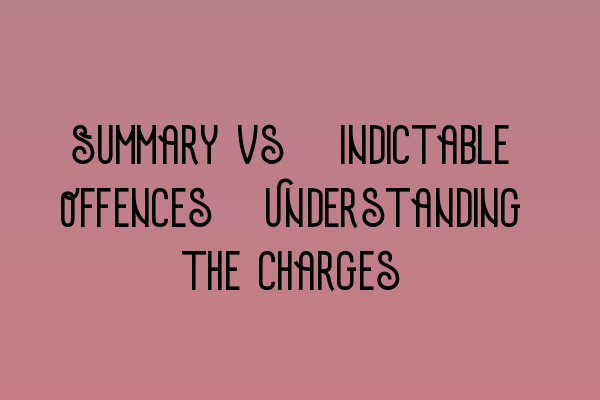Summary vs. Indictable Offences: Understanding the Charges
When it comes to criminal law, it’s important to understand the different types of charges that can be brought against an individual. In the United Kingdom, offences are categorized as either summary offences or indictable offences. Let’s delve into each category to get a better understanding of the charges and their implications.
Summary Offences
Summary offences are less serious offences that are typically heard in the magistrates’ court. They are often referred to as “petty” crimes and include offenses like minor theft, public intoxication, and certain traffic violations. These cases are usually handled by a single magistrate without a jury present.
Because summary offences are less severe, the penalties are generally less harsh compared to indictable offences. Sentences can include fines, community service, and in some cases, a short custodial sentence. However, it’s important to note that some summary offences can still carry significant penalties depending on the circumstances surrounding the case.
If you’re preparing for the SQE 1 exam and want to test your knowledge on criminal law, make sure to check out our SQE 1 Practice Exam Questions that cover a wide range of topics including summary offences.
Indictable Offences
Indictable offences, on the other hand, are more serious crimes that must be heard in either the Crown Court or the High Court of Justice. These offences are often referred to as “major” crimes, which include murder, rape, robbery, and various fraud offenses. Unlike summary offences, indictable offences provide the accused with the right to a trial by jury.
The penalties for indictable offences are usually more severe, and if found guilty, individuals may face longer prison sentences, substantial fines, or a combination of both. The complexity and gravity of these offences often require legal representation from experienced criminal barristers or solicitors.
If you’re looking to excel in the SQE 1 exam and need access to practice mocks, we offer SQE 1 Practice Mocks FLK1 FLK2 that will help test your understanding of indictable offences and other criminal law topics.
The SQE and Criminal Law
The Solicitors Qualifying Examination (SQE) is the new assessment framework that all future solicitors in England and Wales must pass to qualify. It consists of two stages, SQE 1 and SQE 2, which assess a candidate’s legal knowledge and practical skills.
For aspiring solicitors who aim to specialize in criminal law, it is essential to understand the key principles, procedures, and classifications of offences. To prepare effectively, you can enroll in our comprehensive SQE 2 Preparation Courses that cover all aspects of criminal law and practice.
If you haven’t yet taken the first step and need guidance and support to tackle SQE 1, we offer SQE 1 Preparation Courses to help you gain a solid foundation in legal knowledge and skills.
It’s important to stay up to date with the latest information regarding the SQE, including exam dates and registration deadlines. Visit our page to view the SRA SQE Exam Dates and plan your preparation accordingly.
Understanding the differences between summary and indictable offences is crucial for anyone pursuing a career in criminal law. Whether you’re studying for the SQE exams or simply interested in the legal field, knowing the nuances of these charges will help you navigate the complex landscape of criminal justice.
For more in-depth information on criminal law and practice, explore our range of articles and resources at SQE Criminal Law & Practice UK.
